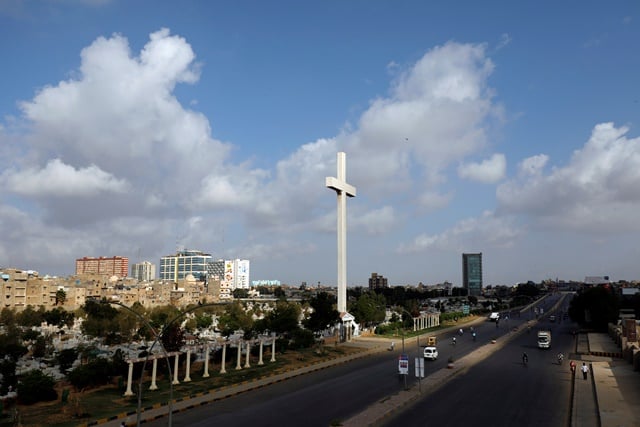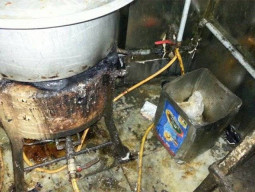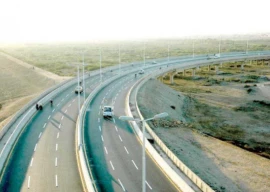
Sindh govt compelled to shift priorities amid pandemic
Several projects, including wheat procurement plan, remain adjourned as resources redirected towards fighting COVID-19
KARACHI: As national coronavirus tally continues to soar, various government departments have pushed all existing matters to the backburner; making pandemic control the overriding concern on their agendas.
Taking a severe hit by the shift in focus, several development schemes meant for Sindh too have landed in a standstill for the unforeseeable future, while the provincial government scrambles to contain the viral threat.
One such example of a halted project is of Sindh’s wheat procurement plan, where not only farmers have been put on the receiving end of unprecedented losses but further delay even holds the risk of a province-wide food crisis waiting to happen.
As per details, the yield is ready and harvesting is underway across various districts in Sindh. However, the provincial government has neither set up procurement centres nor implemented the wheat support price of Rs 1,400 per 40 kilograms, as previously announced.
Affected by the delay in the procurement plan, dozens of people recently staged a sit-in in Sanghar, demanding the provincial government to purchase wheat from the growers. “We have finished harvesting, but local traders are only offering us Rs 1,300 per 40 kilograms. The government had previously announced setting up procurement centres in every district to purchase wheat at support price and also made claims of providing us with gunny bags but any of that is yet to happen,” lamented Sher Mohammad Nizamani, a landlord from Sanghar while speaking to the media. “The expense of fertilisers, seeds and pesticides has touched a new high this year and the government has been reluctant to offer proper rates for our crop. Where should we go and how can we return home without any money?” he added.
Workers facing worst crisis since WWII: UN
As once planned
Two months ago, in a bid to ensure fair distribution of Bardana among the growers, Sindh cabinet in a meeting, had announced that district-wise procurement target would be fixed on proportionate basis.Whereas, regarding the distribution of gunny bags among growers, the cabinet had approved 20% jute and 80% plastic bags and it was also decided that functional flour mills would be allowed to retain wheat stocks of up to of 90 days as per their sanctioned or grinding capacity.
Further, the food department proposed wheat price of Rs 1,400 per 40 kilograms was also approved by the cabinet, during the same meeting. However, a food department official informed The Express Tribune that the government had although set its procurement target at 1.4 million tonnes, proper procurement could never be initiated in the wake of the coronavirus emergency.
British PM Boris Johnson with coronavirus symptoms 'stable' in intensive care
On the other hand, Sindh Abadghar Leader Syed Mohammad Nawaz Shah speaking on behalf of all those affected, shared that the price of flour is surging by the day while the price of wheat is taking a sharp fall. “Growers are being paid as little as Rs 32 per kilogram of harvested wheat whereas consumers are compelled to buy flour for Rs 65 per kilogram from the market,” he added.
Referring to the flour shortage which has come to fore in the last few months, Shah attributed the crisis to the mismanagement of provincial and federal governments.
“Sindh government did not even procure wheat last year, citing that it had eight hundred thousand tonnes in stock. The federal government also turned a blind eye to the issue; leaving people to face the wheat crisis. We suggested the government fix Rs 1,500 per 40 kilograms as the support price and procure wheat without any further delay, but our recommendations too were brushed to the side,” said Shah adding that growers across the province stand at the risk of suffering losses of up to Rs 10 to 12 billion.
“Nothing will happen now as the 80% of wheat harvesting will be completed by the end of this month and wheat consumers will ultimately suffer in the coming days as flour prices spike unprecedentedly,” he warned.
Other projects at a standstill
Sindh Information Minister Nasir Shah however, said that the government had planned to duly procure wheat, but the emerging threat of coronavirus has caused a shift of priorities. “It’s not only us, but the world at large which has dedicated all its resources to fighting the contagious disease.
Besides wheat, most other developmental projects including the nutrition program and mega schemes like Green Line and Karachi Metro Bus Service have also been suspended. But despite current circumstances, the food department has still set up its procurement centres in a few districts where wheat is being purchased on government rates,” the minister informed.
“The severity of the recent pandemic can be taken from the fact that the health department has also suspended the polio campaign in almost all areas and field staff has been confined to their homes until the situation improves,” a polio supervisor working in Karachi told The Express Tribune.
Private schools in Sindh ordered to give 20% fee concession for April, May
Furthermore, the government has also decided to reallocate certain funds to better equip itself deal with the pandemic.
“In a time where all development works in the education sector as well as several health schemes like the polio campaign remain suspended, the government has also put the idea of diverting certain amounts of developmental funds towards the fight against coronavirus into consideration,” an official privy to the development told The Express Tribune.















COMMENTS
Comments are moderated and generally will be posted if they are on-topic and not abusive.
For more information, please see our Comments FAQ